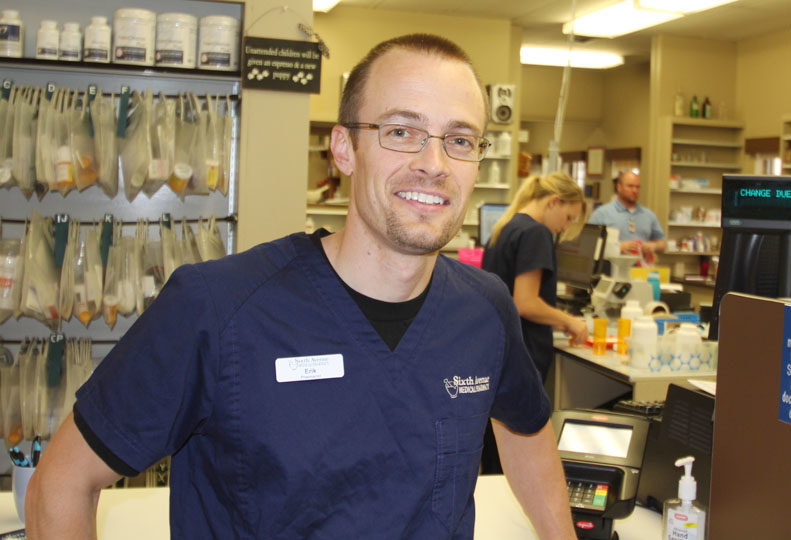
Home » Prescribing independence
Prescribing independence
Sixth Avenue Medical Pharmacy grows with compounding, packaging

September 10, 2015
During an era in which neighborhood pharmacies are being displaced by big chain drug stores, Erik Nelson has struck up a plan that’s making the Sixth Avenue Medical Pharmacy a strong independent.
It started as a purely academic exercise when, as a student in the Washington State University College of Pharmacy, Nelson worked on a team that developed a business plan for a modern independent pharmacy and entered it in the National Community Pharmacy Association’s annual business plan competition.
“The basic plan was to take an independent pharmacy that has deep roots in the community, bring it back up to the standard technologies of the big chains, update the compounding area, and also keep the good old-fashioned customer service the store was founded on,” says Nelson, who’s now 34 years old.
Though Sixth Avenue Pharmacy was the model for the plan, Nelson said he had no intention of buying the pharmacy until his team’s entry won the national competition.
“Prior to that, I only worked in a hospital setting and didn’t realize that ownership was a possibility,” he says. “I never thought in my wildest dreams that I would be a pharmacy owner right out of pharmacy school.”
After impressing judges with the business plan, however, Nelson convinced owner Jerry Stocker that he was up to buying and running the 50-year old Spokane pharmacy.
Nelson had four employees when he took the helm at Sixth Avenue Pharmacy last year. The pharmacy occupies 2,500 square feet of space on the main floor of the Sixth Avenue Medical Center building, at 508 W. Sixth.
Within nine months, Kelly Armstrong, owner of the Fifth & Browne Pharmacy, approached Nelson about buying the assets of that 60-year-old business.
The acquisition doubled Sixth Avenue Pharmacy’s customer base overnight, Nelson says.
“We took on two great employees and got some pretty longstanding history now that we’re merged into one,” he says.
Now, Sixth Avenue Pharmacy has eight employees, including one other pharmacist and a registered dietitian who can help patients with weight loss and nutritional goals, he says.
Nelson has invested in performance-tracking and clinical-information technology that he says compares with technology at pharmacy chains. Even so, independent stores such as his struggle to stay competitive on price.
“Huge chains have big buying power compared to what I have,” he says.
Chain stores also often have dedicated resources to handle back-office operations, he says, adding, “I’m responsible for human resources, purchasing, and paying bills.”
One of the advantages of operating an independent pharmacy, however, is that the owner can adjust procedures for taking care of specific patients without having to check for corporate approval, Nelson says.
“One of our goals is to know patients on a first-name basis,” he says.
Sixth Avenue Pharmacy specializes in packaging and compounding services that pharmacy chains don’t offer, Nelson asserts.
“There’s only about three Spokane pharmacies still doing it,” he says. “It’s an area we really wanted to grow here. We invested a lot and put in a clean room so we can do everything to today’s standards of practice.”
Compounding is the personalized preparation of medications tailored to meet the needs of individual patients. It can include mixing medications into creams, liquids, or chewable forms rather than conventional pill form, Nelson says.
“Compounding allows us to create a dosage that’s more appealing to patients and that might not be available from a commercial drug manufacturer,” he says. “Some people may not absorb pills well or they need a cream or slow-release capsule. We can do any type of dosage form any type of strength.”
Nelson estimates 25 percent of the store’s revenue comes from compounding services, and most compounding is for pet medications.
“I’ve seen people all scratched up from trying to give their cat medicine,” he says. “We can make liver-flavored treats, or beef-flavored liquids, or we can make medicine that can be rubbed onto the pet’s skin where it’s absorbed.”
Sixth Avenue Pharmacy’s specialty-packaging niche includes making capsules and organizing medications into personalized blister packs and medisets that make it easier for people to follow their medication schedule.
“We have some packaging that can help people live in their homes longer,” he says.
The pharmacy also has partnered with Specialty Homecare Lifeline Inc., of Spokane, to provide an automated medication-dispensing service that can contact a family member if an elderly client has missed a medication.
Nelson attributes much of his initial success to mentor Linda Garrelts MacLean, associate dean for advancement and clinical professor at the Washington State University College of Pharmacy, now based in Spokane.
“She helped set up a network of support,” Nelson says.
Now, Sixth Avenue Pharmacy offers internships to WSU pharmacy students on a rotating basis.
Nelson says the WSU program is adept at producing pharmacists who not only understand the clinical aspects, but also the business operations.
“That’s what even chain pharmacies are looking for,” Nelson says. “They want pharmacists who are able to manage in a way that’s profitable for them.”
Nelson’s next plan is to own multiple stores.
“I would love to expand into more locations as the need arises,” he says. “I have a goal of having more than one store in the future, but it’s got to be the right opportunity at the right time.”
Latest News Special Report Health Care
Related Articles




